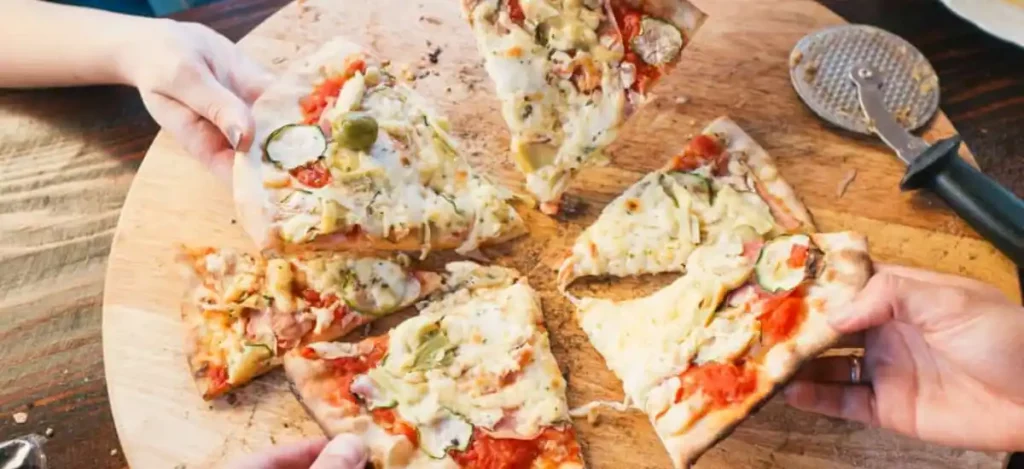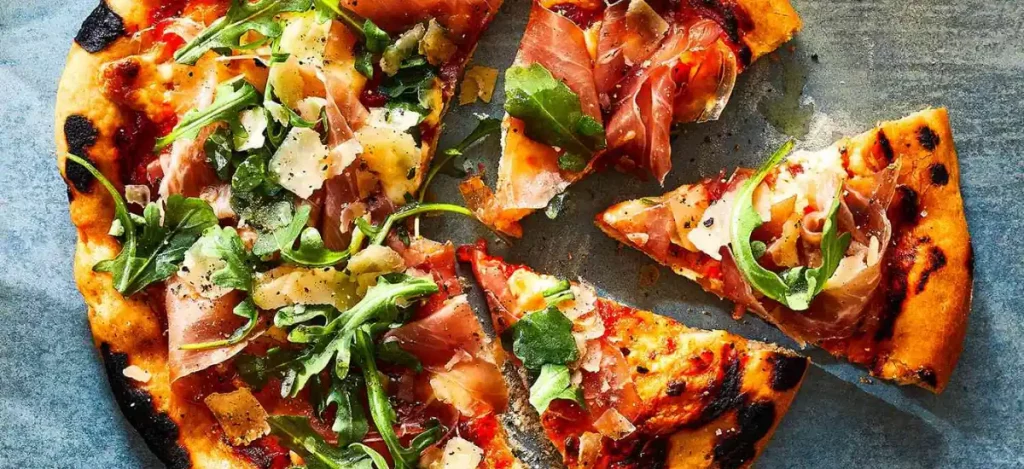Yes, of course! You are free to have pizza with Diverticulitis, but not regularly. If you occasionally consume with proper ingredients, it may not cause any harm as excessive consumption may trigger the symptoms bothering you.
What kind of pizza you have makes a massive difference, as several types of pizza are available with different levels of proteins, fats, and other choices. If you prefer to eat spicy and greasy containing red meat and heavy cheese filled in it, then you must stop having that.
The pizza itself does not cause harm to your stomach. The toppings or ingredients in it do. So, you must understand that spicy, greasy, or cheesy pizza can elevate inflammation and abdominal pain. If you crave your pie, occasionally choose a well-proportioned, mildly spicy pizza to minimize risk factors.
When you are suffering from Diverticulitis, you must be aware of the food you are eating, and to entirely understand how food can impact this condition, you must go through a thorough understanding of the disease. If you are willing to add high-fiber foods to your diet, you must consult your doctor first.

What Is Diverticulitis And How Is It Different From Diverticulosis?
Diverticulitis is a gastrointestinal issue that takes place in the large intestine. It is distinguished by inflammation of abnormal pouches, called diverticula, by a bacterium- which may occur in the large intestinal wall. You can experience lower abdominal pain, diarrhea, nausea, or constipation. In complicated cases, one can have a fever, blood in the stool, or abnormal bowel habits.
The estimated causes of Diverticulitis are as follows:
- Genes
- Excess weight
- Habit of smoking
- Consuming steroids, anti-inflammatory drugs, or painkillers regularly
- An unhealthy diet containing high animal products and less fibers
Here Are The Differences Between Diverticulosis And Diverticulitis-
The state of occurrence of tiny, bulging pouches (diverticula) in the digestive tract is known as Diverticulosis. But the inflammation of one or more of these pouches is known as Diverticulitis. Diverticulosis may be portrayed as the risk factor for Diverticulitis.
Sometimes the patients can not feel that they are having Diverticulosis as it causes very mild symptoms with mild cramps, constipation, or bloating. So, Diverticulosis is not very painful. But when it results in Diverticulitis, it can cause much more pain. Based on estimation, only 5% of people suffering from diverticulosis result in Diverticulitis.
Can You Eat Cheese If You Have Diverticulitis?
Cheese is a low-fiber food. It can be eaten but with precaution when it is being chosen as toppings by someone who is suffering from diverticulitis. Eating limited cheese in the daily diet can cause no issue or else you might face issues of inflammation and prevent future attacks. Of any bad health.
What Ingredients Should I Eat On Pizza When I Have Diverticulitis?

While eating pizza with Diverticulitis, try to focus on eating healthy toppings to reduce the risk of diverticulitis outbreaks. For instance, a whole wheat bread pizza with nutrients like fiber, most B vitamins, and magnesium help to improve your overall digestive system and minimize the risk of outbreaks.
It is always recommended to consult a doctor for better suggestions of what to eat. However, here are some suggested ingredients that you can eat on your pizza include:
- Vegetables: You can have most vegetables, such as carrots, capsicum, beets, tomatoes, green beans, sweet potatoes, spinach, etc., on your pizza to make it healthy and improve your digestive health in Diverticulitis.
- Cheese: Try to eat low-fat cheese with minimum calories, including non-milk cheese varieties on pizza when you suffer from Diverticulitis.
- Protein: Fish, chicken, egg whites, tofu, and other sources of lean proteins can be included in pizza to make it healthy and tasty.
- Nuts: You can eat almonds, peanuts, and other nuts on your pizza in Diverticulitis.
- Fruits: You can eat blueberries, blackberries, avocado, strawberries, etc., on your pizza in Diverticulitis.
What Ingredients Should I Avoid On Pizza When I Have Diverticulitis?

You can have many toppings on pizza, but a few must be avoided when suffering from Diverticulitis. Either prevent the toppings entirely from your pie or consume them at microscopic levels. Just a few toppings or things that one should take off their pizza when craving to have the next pie
- It would be best if you avoid fried or deeply fried toppings like deeply fried shrimp.
- Dairy products with high amounts of fat including yogurt and milk (here, you can go for low-fat-containing substitutes, like almond milk)
- Some vegetables like broccoli, brussels sprouts, cabbage, and cauliflower you must avoid
- Some spices like peppers and red chili flexes are the must ones to avoid
- Onion and garlic are better to avoid
- Leguminous veggies like beans you should not add to your pizza
- High fat-containing meats you must eliminate from your pizzas to avoid the worsening state of the outbreak
- You must not add fermented toppings, like kimchi, sauerkraut, etc.
Taking the foods mentioned earlier in minute amounts may not cause any harm to the stomach. You can add a bit of pepper to your pizza which may not worsen the condition.
But if you can avoid such foods altogether, it would be the best option to choose because we are miserable that we cannot predict the situations as they typically vary from one person to another in the case of Diverticulitis.
Frequently Asked Questions
Q1. Can you eat spaghetti with diverticulitis?
A1. Since Spaghetti is a low-fiber content food with low residue, it is perfect for eating in diverticulitis. White rice, white bread, and pasta are also good.
Q2. Can you eat cheese with diverticular?
A2. Yes, cheese is a low-fiber food, so you can eat it with diverticular issues. It can help you in ceasing future attacks.
Q3. What triggers diverticulitis flare-ups?
A3. Consuming high-fiber food can flare up the diverticulitis issue all the more. Eating fresh foods can prevent regular flare-ups easily.
Read More: Is 1 Week Old Pizza In Fridge Is Safe Or Not?
